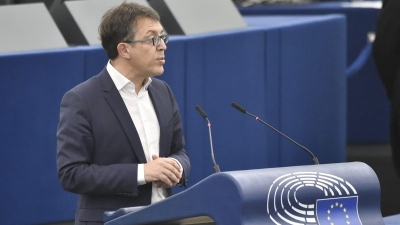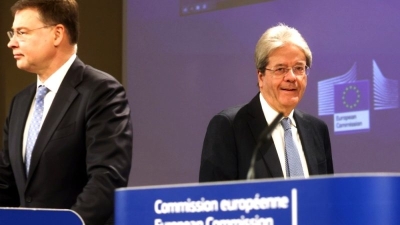France: Unions at loggerheads with government over post-pension next steps

French Prime Minister Elisabeth Borne has started talks with the largest trade unions in the hope of restarting social dialogue after months of political wrangling over a contested pension reform, and building a new “life-at-work pact”.
After months of political clashes, where trade unions united against the government’s pension reform that will raise the legal retirement age from 62 to 64, Borne is keen to move on at all costs. The meetings started on Tuesday evening and were due to continue until Wednesday afternoon.
In April, President Emmanuel Macron announced the start of “a hundred days of peace” and his intention to build a new “life-at-work pact”, in an effort to improve working conditions across the country.
Union leaders are dubious this may lead very far but, for the first time in months, they agreed to sit down with Prime Minister Borne, for a series of one-on-ones.
Five trade union leaders are due to meet Borne in an attempt to break the deadlock and work in partnership on overarching issues such as old-age employment, working conditions, and wage increases.

ANALYSIS: Macron’s uphill battle to get the French to like their jobs
A number of structural reforms introduced by French President Emmanuel Macron in 2017 have brought employment back to pre-2008 levels. However, the French are growing more and more disenfranchised with their jobs.
After months of political fights over a widely-rejected pensions …
Upping wages, a key demand
All unions agree that wages need to be upped in light of ever-rising inflation – which stood at 5.2% in 2022 compared to 1.6% in 2021 and 0.5% in 2020, according to France’s Statistics body.
Wages, on the other hand, only increased by 3.7% in 2022. Only the minimum wage, which is pegged to inflation, grew by 6.6% last year.
As a starting point, unions want to ensure that collective wage negotiations across all industries match the official minimum wage. Companies have the legal obligation to enter into negotiations to review sector-specific minimum pay up to 45 days after the official minimum wage has been increased.
Yet, close to none of the sectors have yet seen these new rounds of negotiations, warned Chabanier, who wants to make state aid conditional on companies paying their staff decently.
Far-left CGT head Sophie Binet also suggested that wages be pegged to inflation. Otherwise, she warned, companies have the incentive to keep wages low, at a time when social dialogue is at a “dead end”.
As for Macron’s announcement on Monday (15 May) that there would be a further €2 billion tax cut for households, it fell flat.
“It hardly makes for a proper social policy,”, centre-left CFDT Laurent Berger said. He accused the government of “laziness for not completing a review of the country’s fiscal policy” and moving towards fairer redistribution.

French government presents broad appeasement plan to overcome crisis
French Prime Minister Elisabeth Borne presented a government roadmap on Wednesday (26 April) aiming to lay down “concrete solutions” in areas including immigration, ecology, health, and education and appease the nation after fierce protests over a recent pension reform
Work conditions on everyone’s minds
Moreover, trade unions also want to talk about working conditions.
“The organisation of work must be brought into the public debate,” Berger said. He said that not all can change through legislation and voiced hope for a paradigm shift so as to give workers “more leeway” to organise.
Alongside Binet, he suggested a conversation should also start over the four-day working week. Binet, for her part, said that “we need to talk about a reduction in working hours” – a point she is ready to raise with Borne.
As EURACTIV reported, a study by the European Agency for Safety and Health at Work (EU-OSHA) from September 2022 found that only 71% of French workers thought there were good measures to protect workers’ health in their workplace – compared to an 80% EU-wide average.
Worse still: an average of 50% of French were exposed to severe time pressures, while the average figure stands at 31% in the whole of the EU.

Macron’s new labour reform tells story of France’s poor working conditions
France’s embattled leader Emmanuel Macron has announced a new large-scale labour reform, hoping to revive his political standing with a new “life-at-work pact” in the wake of a pension reform crisis that angered the nation and marred his second presidential mandate.
All against pension reform
Unions might be willing to come back to the negotiating table but this does not mean their fight against the pension reform is over.
A new nationwide protest is planned for 6 June. Two days before meeting Elisabeth Borne, unions unanimously signed a communiqué calling for a definitive withdrawal of the reform.
This is the first issue Berger will raise in his one-on-one, pointing to a “feeling of anger” throughout the country, which only the repeal of the reform can assuage.
In a separate development, a group of MPs are expected to file a bill to abrogate the pensions reform, signed into law in April, a move welcomed by all unions.
“This is our last chance”, Chabanier said.
On the other hand, Borne considers this abrogation bill to be “irresponsible”, warning it would contribute to “worsening the financial imbalance” of the pension system.

Opposition vows to fight until French pensions reform is abolished
The opposition to French President Emmanuel Macron’s pensions reform, which was adopted on Saturday, is vowing to take to the streets until the legislation is permanently shelved.
The left-wing NUPES coalition – which brings together the far-left, socialists, communists and the …
Read more with EURACTIV




